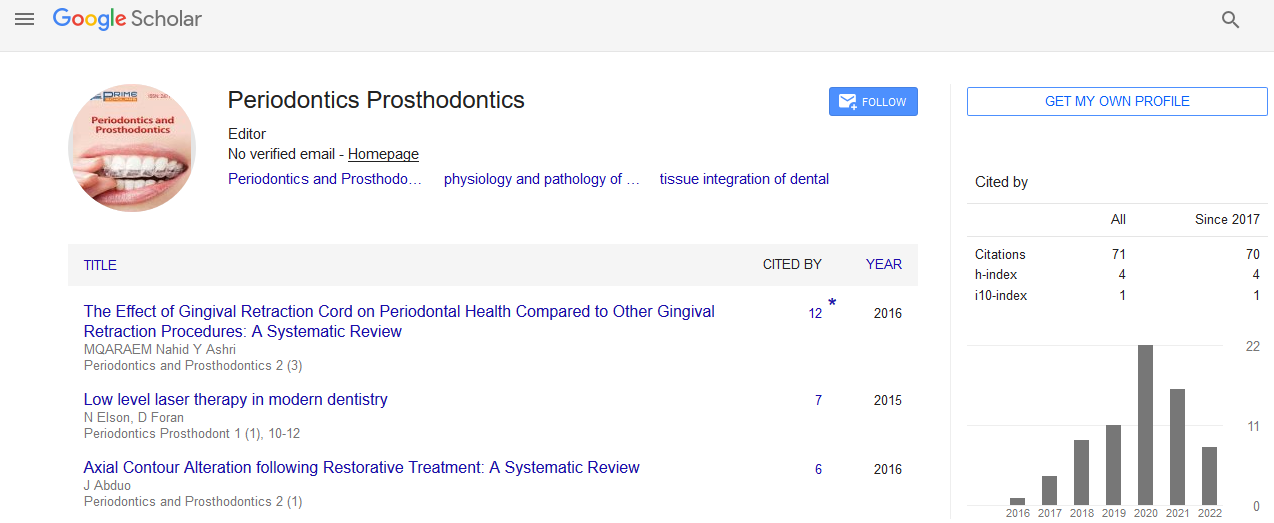Short Communication - (2023) Volume 9, Issue 4
The Enigma of Permanent Immature Teeth: Unraveling Causes, Impacts, and Management
Mosa Altassan*
Department of Medicine, University of Trieste, Italy
*Correspondence:
Mosa Altassan,
Department of Medicine, University of Trieste,
Italy,
Email:
Received: 29-Nov-2023, Manuscript No. IPPDPD-24-19786;
Editor assigned: 01-Dec-2023, Pre QC No. IPPDPD-24-19786;
Reviewed: 15-Dec-2023, QC No. IPPDPD-24-19786;
Revised: 20-Dec-2023, Manuscript No. IPPDPD-24-19786;
Published:
27-Dec-2023, DOI: 10.36648/2471-3082.23.9.38
Introduction
Permanent immature teeth, also known as immature permanent
dentition or immature permanent dentition, refer to a condition
where the permanent teeth fail to fully develop or mature properly.
This condition can have various causes and consequences,
impacting both oral health and overall well-being. Understanding
the factors contributing to immature permanent teeth, their
effects, and potential management strategies is crucial for dental
professionals and patients alike. Several factors can contribute to
the development of permanent immature teeth.
Description
Genetic predispositions can influence the development of teeth,
including abnormalities in tooth structure or development that
may lead to immature permanent teeth. Traumatic injuries to the
teeth during childhood or adolescence can disrupt normal tooth
development, leading to immature permanent teeth. Untreated
dental infections, such as dental caries or abscesses, can affect
the growth and development of permanent teeth, resulting in
immature formation. Certain systemic conditions or medical
treatments, such as nutritional deficiencies or chemotherapy,
can interfere with tooth development, contributing to immature
permanent teeth. The consequences of permanent immature
teeth can vary depending on the severity of the condition and
the affected teeth. Some common consequences include immature
permanent teeth may appear smaller, misshapen, or discolored
compared to fully developed teeth, impacting the individual’s
smile and self-confidence. Immature permanent teeth may
be weaker and more prone to damage, leading to difficulties in
biting, chewing, and speaking. Immature permanent teeth may
be more susceptible to dental decay, infections, and other oral
health issues, necessitating ongoing dental care and treatment
[1-4]. The aesthetic and functional challenges associated with
permanent immature teeth can have psychological effects, affecting
the individual’s social interactions and emotional well-being.
Managing permanent immature teeth requires a multidisciplinary
approach involving dental professionals, orthodontists,
and sometimes, other healthcare providers. Treatment options
may include in some cases, especially when the immature teeth
are asymptomatic and not causing significant functional or aesthetic
concerns, a conservative approach of monitoring may be
adopted. Dental restorations such as fillings, crowns, or veneers
may be recommended to improve the appearance and strength
of immature permanent teeth, restoring their function and aesthetics.
Orthodontic interventions, such as braces or aligners,
may be necessary to correct misalignment or malocclusion issues
associated with immature permanent teeth. In cases of severe
tooth decay or infection, root canal therapy (endodontic treatment)
may be performed to remove diseased tissue and preserve
the immature permanent tooth. In rare cases of severe tooth development
abnormalities or trauma, surgical interventions such
as tooth extraction or dental implants may be considered [1-4].
Conclusion
Permanent immature teeth pose significant challenges to dental
health and overall well-being. By understanding the causes,
consequences, and management options for this condition,
dental professionals can provide timely and appropriate care to
affected individuals, improving their oral health and quality of
life. Continued research and advancements in dental science are
essential for further enhancing our understanding and management
of permanent immature teeth. Permanent immature teeth
epitomize a complex conundrum within the domain of dentistry,
necessitating a nuanced understanding and tailored management
approach. By unraveling the intricate interplay of causative
factors, discerning the manifold impacts, and embracing a multidisciplinary
treatment paradigm, dental professionals can navigate
the labyrinth of permanent immature teeth adeptly, thereby
ameliorating oral health outcomes and enhancing the quality of
life for affected individuals. Surgical interventions like apexogenesis,
apexification, or tooth transplantation may be contemplated in select cases of permanent immature teeth to promote continued
root development or replace non-viable teeth.
Acknowledgement
None.
Conflict Of Interest
The author’s declared that they have no conflict of interest.
References
- Kruk ME, Gage AD, Arsenault C, Jordan K, Leslie HH, et al. (2018) High-quality health systems in the sustainable development goals era: Time for a revolution. Lancet Glob Health 6(11): e1196-e1252.
[Crossref] [Google Scholar]
- Oyekale AS, Titilola HA, Abioye OP (2019) Adequacy of health care delivery facilities in rural South Western Nigeria: Evidence from a health facility census. J Pub Health Afr 10(2): 866.
[Crossref] [Google Scholar]
- Olmen VJ, Marchal B, Damme W, Kegels G, Hill PS, et al. (2017) The health system dynamics framework: The introduction of an analytical model for health system analysis and its application to two case-studies. Health Cultur Soc 9(1): 1-21.
[Crossref] [Google Scholar]
- Perry HB, Zulliger R, Rogers MM (2014) Community health workers in low middle, and high-income countries: An overview of their history, recent evolution, and current effectiveness. Annu Rev Public Health 35: 399-421.
[Crossref] [Google Scholar]
Citation: Altassan M (2023) The Enigma of Permanent Immature Teeth: Unraveling Causes, Impacts, and Management. Periodon
Prosthodon. 9:38.
Copyright: © 2023 Altassan M. This is an open-access article distributed under the terms of the Creative Commons Attribution
License, which permits unrestricted use, distribution, and reproduction in any medium, provided the original author and source
are credited

